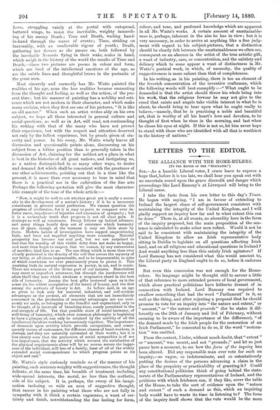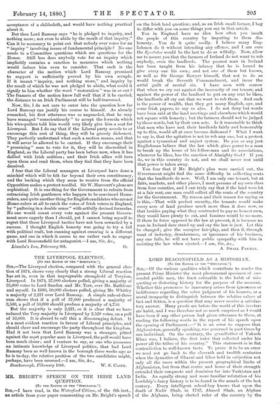LETTERS TO THE EDITOR.
THE ALLIANCE WITH THE HOME-RULERS.
(TO THE EDITOR OF THE " SPECTATOB.1
SIR,—As a humble Liberal voter, I crave leave to express a hope that, before it is too late, we shall hear you speak out with no uncertain sound upon the grave discredit and danger which proceedings like Lord Ramsay's at Liverpool will bring to the Liberal cause.
I take the facts from his own letter to this day's Times. He began with saying, "I am in favour of extending to Ireland the largest share of self-government consistent with maintaining the integrity of the United Kingdom, and I will gladly support an inquiry how far and to what extent this can be done." There is, at all events, no absurdity here in the form of the inquiry proposed, but the main proposition of the sen- tence is calculated to make sober men reflect. Would it not be said to be consistent with maintaining the integrity of the United Kingdom to allow an Irish representative body sitting in Dublin to legislate on all questions affecting Irish land, and on all religions and educational questions in Ireland P And would anything less than this satisfy Irish agitators ? If Lord Ramsay has not considered what this would amount to, the Liberal party in England ought to do so, before it endorses him.
But even this concession was not enough for the Home- rulers. Its language might be thought still to savour a little of that reference to more extended powers of local government, which alone practical politicians have hitherto dreamt of in connection with Ireland. Lord Ramsay was required to swallow something that had the word " Parliament" in it, as well as the thing, and after rejecting a proposal that he should promise to vote for an inquiry into "the nature and extent," or " amount," or " the nature and grounds" (for he states it dif- ferently on the 28th of January and 3rd of February, without seeming to be aware of the importance of the difference), " of the demand made by the Irish people for the restoration of an Irish Parliament," he consented to do so, if the word " restora- tion" was omitted.
From the context, I infer, without much doubt, that " extent " or " amount," was meant, and not "grounds ;" and let us just pause here a moment, to see how the form, of the inquiry has been altered. Did any responsible man ever vote for such an inquiry,—so vague, so indeterminate, and so ostentatiously putting the desires of the persons advancing a claim in the place of the propriety or practicability of granting it P Could any constitutional politician think of going behind the state- ments of the Parliamentary representatives of Ireland, and the petitions with which Irishmen can, if they like, cover the table of the House, to take the sort of evidence upon the "nature and extent " of such a demand as this, which an inquiring body would have to waste its time in listening to ? The form of the inquiry itself shows that the vote would be the mere
acceptance of a shibboleth, and would have nothing practical about it.
But then Lord Ramsay says "he is pledged to inquiry, and nothing more ; not even to abide by the result of that inquiry." Can it be necessary to point out that nobody ever votes for an 4` inquiry " involving issues of fundamental principle ? No one sends to a Committee questions which are questions for the House. Still less does anybody vote for an inquiry which implicitly contains a sanction to measures which nothing would induce him even to consider. That such is the character of the motion which Lord Ramsay promised to support is sufficiently proved by his own scruple. If it meant " inquiry, and nothing more," and inquiry by the result of which he was not pledged to abide, what could it signify to him whether the word " restoration" was in or out ? The framers of the motion know full well that if it be carried, the distance to an Irish Parliament will be half-traversed.
Now, Sir, I do not care to enter into the question how far Lord Ramsay can justify his course to himself. As already remarked, his first utterance was so unguarded, that he may have managed " conscientiously " to accept the formula which his wire-pullers told him would very likely give him a seat for Liverpool. But I do say that if the Liberal party accede to or encourage this sort of thing, they will be grossly dishonest. They perfectly understand what such a motion means, and that it will never be allowed to be carried. If they encourage their ‘` promising " men to vote for it, they will be discredited in England, as the Liberal party has been before now, when it has dallied with Irish sedition ; and their Irish allies will turn upon them and rend them, when they find that they have been deceived.
I fear that the Liberal managers at Liverpool have done a mischief which will be felt far beyond their own constituency, and the backing which they seem to receive from the official Opposition makes a protest needful. Sir W. Harcourt's pleas are sophistical. It is one thing for the Government to refrain from ostracising Irish gentlemen who happen to be convinced Home- rulers, and quite another thing for English candidates who are not Home-rulers at all to catch the votes of Irish voters in England, by " paltering in a double sense" with artfully devised formulas. No one would count every vote against the present Govern. ment more eagerly than I should, yet I cannot bring myself to regret that these Liverpool tactics have not been rewarded by a success. I thought English honesty was going to try a fall with political craft, but cunning against cunning is a different game, and one in which it seems to me rather rash to engage with Lord Beaconsfield for antagonist.—I am, Sir, &c.,



































 Previous page
Previous page